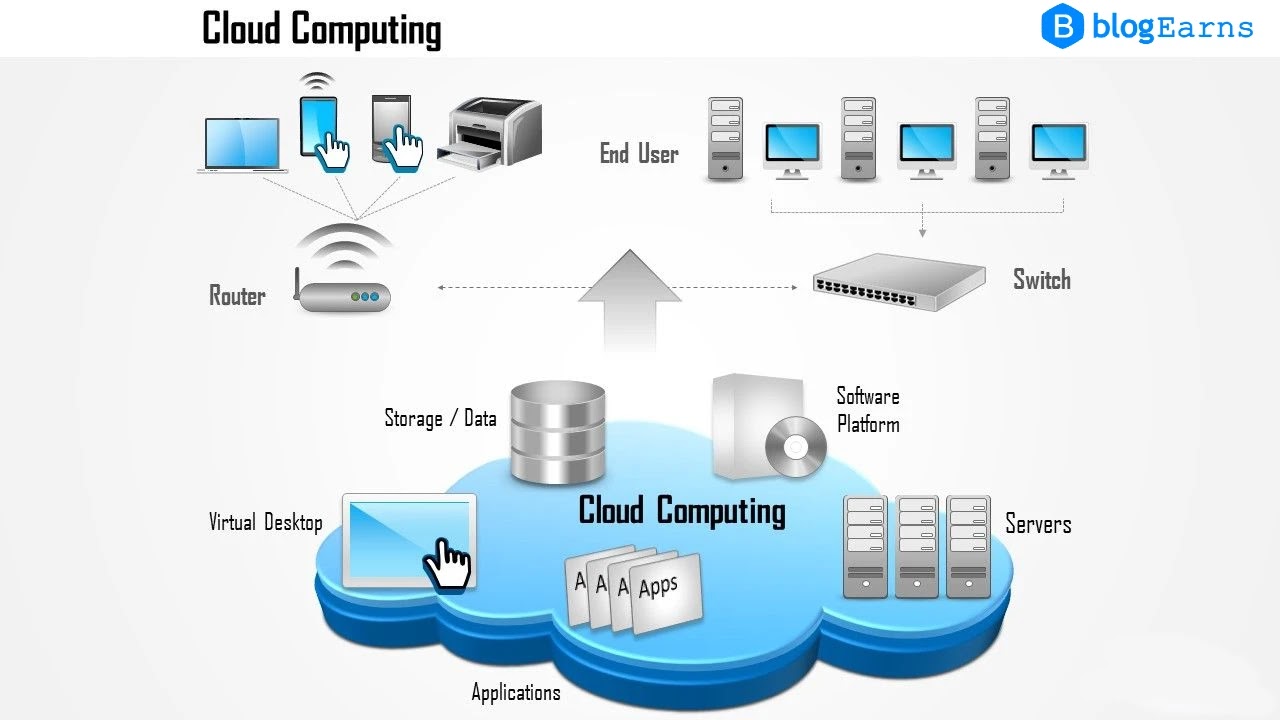Navigating the Cloud: Exploring the World of Cloud Computing Service Providers
Introduction:
In today’s digital age, where businesses are increasingly reliant on cloud computing for their infrastructure and software needs, the role of cloud service providers (CSPs) has become paramount. Cloud service providers offer a wide range of services, including storage, computing power, and software applications, allowing organizations to leverage the scalability, flexibility, and cost-efficiency of the cloud. As the demand for cloud services continues to rise, it is essential to understand the landscape of cloud service providers and their offerings to make informed decisions and maximize the benefits of cloud computing.
The Role of Cloud Service Providers:
Cloud service providers are companies that deliver cloud computing services to businesses and individuals. They operate vast data centers housing an extensive network of servers, storage systems, and networking infrastructure. These providers offer various cloud deployment models, such as public, private, hybrid, and multi-cloud, catering to different business requirements.
Key Cloud Service Providers:
Amazon Web Services (AWS)
Amazon Web Services (AWS) has established itself as the market leader in cloud computing services, providing a complete set of scalable, dependable, and secure solutions. As a subsidiary of Amazon.com, AWS provides a wide range of cloud-based services that enable businesses of all sizes to leverage the power of the cloud. Among these offerings, AWS Digital Asset Management stands out, delivering solutions for businesses to efficiently organize, store, and retrieve their multimedia assets in a centralized cloud environment. From computing power and storage to databases, machine learning, and analytics, AWS has revolutionized the way organizations build, deploy, and manage their applications and infrastructure.
A comprehensive suite of services:
AWS has a broad portfolio of cloud services that meet a diverse set of requirements. Here are some of the major services provided by AWS:
| 1. Compute Services: |
|---|
| Amazon Elastic Compute Cloud (EC2): EC2 provides scalable compute capacity in the cloud, allowing businesses to quickly provision virtual servers to meet their computational needs. |
| AWS Lambda: A serverless computing service that allows developers to run code without having to create or manage servers, merely paying for compute time. |
| 2. Storage Services: |
| Amazon Simple Storage Service (S3): S3 provides scalable object storage for storing and retrieving data. It offers high durability, availability, and performance, making it suitable for a wide range of applications. |
| Amazon Elastic Block Store (EBS): EBS provides persistent block-level storage volumes for EC2 instances, allowing businesses to store data and access it across multiple instances. |
| 3. Database Services: |
| Amazon Relational Database Service (RDS): RDS provides managed database services for popular relational database management systems (RDBMS) such as MySQL, PostgreSQL, Oracle, and Microsoft SQL Server. |
| Amazon DynamoDB: A fully managed NoSQL database service that provides seamless scalability and low-latency performance for applications requiring high throughput and low response times. |
| 4. Machine Learning and AI Services: |
| Amazon SageMaker: A fully managed service that allows developers and data scientists to construct, train, and deploy machine learning models rapidly and simply. |
| Amazon Recognition: A deep learning-based image and video analysis service that can automatically detect objects, scenes, and faces, and perform facial recognition. |
| 5. Analytics Services: |
| Amazon Redshift: A fully managed data warehousing service that allows businesses to quickly and cost-effectively analyze large datasets using SQL queries. |
| Amazon Athena: An interactive query service that enables businesses to analyze data directly from Amazon S3 using standard SQL syntax without the need for complex data transformation or loading processes. |
These are just a few examples of the extensive suite of services provided by AWS. The platform provides a host of other services, including networking, security, content delivery, Internet of Things (IoT), serverless computing, and more, to meet a wide range of business needs.
Scalability, Reliability, and Global Infrastructure:
One of the key advantages of AWS is its unparalleled scalability and reliability. Businesses can easily scale up or scale down their infrastructure based on demand without requiring a significant upfront investment in hardware. AWS’s global infrastructure is spread across more than 80 availability zones in 25 geographic regions around the world, allowing businesses to deploy their applications closer to end users for low latency and enhanced performance.
Security and Compliance:
AWS places a heavy emphasis on security, offering a robust set of security features and controls. These include encryption at rest and in transit, identity and access management, network security, and DDoS protection. AWS also maintains various compliance certifications, such as ISO 27001, SOC 1/2/3, HIPAA, and PCI DSS, ensuring that businesses can meet regulatory requirements when using the platform.
Cost Optimization:
AWS offers a flexible pricing model, allowing businesses to optimize costs based on their usage patterns. With options such as on-demand instances, reserved instances, and spot instances, organizations can choose the most cost-effective approach for their workloads. AWS also provides cost management tools and services, allowing businesses to monitor, analyze, and control their cloud spending.
Community and Support:
AWS has a large and active community of developers, architects, and enthusiasts, offering resources, forums, and documentation. Additionally, AWS offers comprehensive support options, including various levels of technical support, documentation, and training programs, to help businesses maximize their AWS experience.
Microsoft Azure
Microsoft Azure has emerged as a leading cloud computing platform, providing a wide range of services and solutions to help organizations leverage the power of the cloud. As part of a comprehensive suite of Microsoft offerings, Azure enables businesses to build, deploy and manage applications and infrastructure with scalability, flexibility, and robust security. With an emphasis on integration, innovation, and enterprise-grade capabilities, Microsoft Azure has become the preferred choice for businesses across various industries.
A comprehensive suite of services:
Microsoft Azure offers a wide range of cloud services to meet diverse business needs. Here are some of the major services provided by Azure:
| 1. compute Services: |
|---|
| Virtual Machines (VMs): Azure VMs provide scalable and flexible computing power, allowing businesses to provision and manage virtual machines based on their specific needs. |
| Azure Kubernetes Service (AKS): A fully managed container orchestration service that simplifies deployment, management, and scaling of containerized applications. |
| 2. Storage Services: |
| Azure Blob Storage: A scalable and secure object storage service designed to store large amounts of unstructured data such as documents, images, and videos. |
| Azure Files: A fully managed file storage service that enables organizations to share files across applications and virtual machines. |
| 3. Database Services: |
| Azure SQL Database: A fully managed relational database service that provides a high-performance, scalable, and secure SQL database for mission-critical applications. |
| Azure Cosmos DB: A globally distributed, multi-model database service that provides low-latency, scalable, and highly available data storage for modern applications. |
| 4. AI and Machine Learning Services: |
| Azure Machine Learning: A comprehensive platform that enables businesses to build, deploy, and manage machine learning models at scale with integration capabilities across the Azure ecosystem. |
| Azure Cognitive Services: Pre-built AI models and APIs that allow organizations to add capabilities such as vision, speech, language understanding, and sentiment analysis to their applications. |
| 5. Analytics Services: |
| Azure Synapse Analytics: An analytics service that brings together big data and data warehousing capabilities to help organizations analyze massive amounts of data for valuable insights. |
| Azure Data Lake Storage: A scalable and secure data lake that allows organizations to capture, store, and analyze large amounts of structured and unstructured data. Implementing such a robust system often benefits from specialized data lake consulting. |
These services represent only a fraction of the broad range of offerings available on the Azure platform. Azure also provides solutions for networking, security, the Internet of Things (IoT), serverless computing, and more, meeting the diverse needs of businesses.
Flexible Pricing Model:
Microsoft Azure offers a variety of pricing models that meet different workload requirements and business scenarios. Here are some of the major pricing models offered by Azure:
- Pay as you go Pricing: Azure’s pay-as-you-go pricing allows businesses to pay for the specific resources and services they consume. This model is suitable for unpredictable workloads as it provides the flexibility to scale up or down resources based on demand. Fees are typically based on factors such as compute instance usage, storage consumption, data transfer, and the specific services used.
- Reserved Example: Azure offers Reserved Instances that allow businesses to commit to specific virtual machine instances for a period of one or three years, resulting in discounted rates. This pricing model is beneficial for workloads with predictable resource requirements, providing cost savings over the long term.
- Spot Virtual Machines: With Azure Spot virtual machines, businesses can take advantage of untapped capacity at significantly lower costs. Spot VMs are suitable for fault-tolerant and flexible workloads that can handle interruptions. Azure dynamically adjusts pricing based on supply and demand, making it an affordable option for some applications.
- Transparent Membership Fee: Microsoft Azure ensures transparency in its subscription charges, enabling businesses to effectively understand and manage their cloud Expense Management Software. Azure provides detailed billing reports and usage insights, allowing organizations to monitor their consumption and identify cost optimization opportunities. Azure Portal provides a comprehensive view of usage and associated charges, empowering businesses to make informed decisions about resource allocation and usage.
Budget and Cost Optimization Tools:
Azure offers a number of tools and features to help businesses budget and optimize costs:
- Azure Cost Management and Billing:Azure’s cost management and billing feature provides visibility into budgets and spending across subscriptions, enabling businesses to set budget alerts, view cost breakdowns, and analyze trends. This tool helps organizations track their cloud spending and optimize costs.
- Azure Consultant:Azure Advisor is a built-in recommendation engine that provides personalized guidance to optimize resources and improve cost efficiency. It offers tips on powering virtual machines, using reserved instances, and optimizing storage costs, among other areas.
- Azure Pricing Calculator:The Azure Pricing Calculator allows businesses to estimate and compare costs for different Azure services and configurations. This enables organizations to evaluate pricing scenarios and make informed decisions about resource selection and deployment.
Integrations and enterprise-grade capabilities:
Microsoft Azure stands out for its strong integration capabilities with other Microsoft products and services. Businesses already using Microsoft technologies can integrate Azure seamlessly into their existing infrastructure, allowing for a seamless transition to the cloud. Azure also offers robust enterprise-grade features, including identity and access management, compliance certification, hybrid cloud connectivity, and comprehensive monitoring and management tools.
Scalability, Reliability, and Global Presence:
Azure provides scalable and reliable infrastructure that can meet the demands of businesses of all sizes. With Azure’s global presence spanning more than 60 regions around the world, businesses can deploy their applications and data closer to their customers while ensuring low latency and enhanced performance. Azure’s commitment to high availability and disaster recovery is exemplified through features such as Azure Availability Zones and Azure Site Recovery.
Security and Compliance:
Microsoft Azure emphasizes security and compliance, providing businesses with robust tools and features to protect their data. Azure offers various security mechanisms including encryption, threat intelligence, access control, and continuous monitoring. It also holds an extensive list of compliance certifications, including ISO 27001, SOC 1/2/3, HIPAA, and GDPR, to help businesses meet regulatory requirements.
Support and Ecosystem:
Azure offers comprehensive support options, including documentation, community forums, and a wide range of support plans, to assist businesses at each step of their cloud journey. Additionally, Azure has a vibrant ecosystem of partners, enabling businesses to access specialized services, solutions, and industry expertise.
Google Cloud Platform (GCP)
Google Cloud Platform (GCP) has rapidly emerged as a leading cloud computing service provider, offering businesses a comprehensive suite of services and solutions to transform their operations in the digital era. With Google’s extensive experience in managing massive amounts of data and its commitment to innovation, GCP enables organizations to leverage the power of the cloud, harness advanced technologies, and drive their business success to new heights.
Unleashing the Potential of the Cloud
Google Cloud Platform provides a wide range of services and tools that empower businesses to build, deploy, and scale their applications and infrastructure in the cloud. Here are some key aspects that make GCP a powerful cloud computing service provider:
- Scalable and Reliable Infrastructure:GCP offers a globally distributed infrastructure, comprising data centers strategically located in various regions worldwide. This allows businesses to deploy their applications closer to their users, reducing latency and improving performance. With Google’s expertise in managing high-volume workloads, GCP provides scalability and reliability to handle businesses’ varying demands, ensuring seamless operations even during peak periods.
- Comprehensive Cloud Services:GCP offers an extensive portfolio of cloud services tailored to meet diverse business needs. Some notable services include:
- Compute Engine: Provides virtual machines (VMs) for businesses to run their workloads with flexibility and scalability.
- App Engine: A fully managed platform that enables businesses to build and deploy applications without worrying about infrastructure management.
- Kubernetes Engine: A managed environment for deploying, managing, and scaling containerized applications using Kubernetes.
Additionally, GCP offers services for storage, databases, networking, machine learning, artificial intelligence, big data analytics, and more. This comprehensive suite of services empowers businesses to leverage cutting-edge technologies to drive innovation and achieve their goals.
- Advanced-Data and Analytics Capabilities:GCP’s data and analytics services enable businesses to unlock valuable insights from their data. Services like BigQuery provide a serverless data warehouse solution, allowing organizations to analyze massive datasets with high performance and scalability. GCP also offers Dataflow, Datastore, Pub/Sub, and other services that facilitate real-time streaming analytics, data processing, and storage, empowering businesses to make data-driven decisions in a fast-paced digital landscape.
- AI and Machine Learning:Google Cloud Platform incorporates powerful artificial intelligence (AI) and machine learning (ML) capabilities. Services like AutoML enable businesses to build custom ML models without requiring extensive expertise, while Cloud Vision, Speech-to-Text, and Translation APIs provide pre-trained models for various applications. GCP’s AI and ML tools empower businesses to automate processes, extract insights, enhance customer experiences, and innovate across industries.
- Security and Compliance:Google Cloud Platform prioritizes security and compliance to protect businesses’ sensitive data. GCP ensures data encryption at rest and in transit, implements robust access controls, and offers a range of security features and monitoring tools. Moreover, GCP adheres to global security and compliance standards, including ISO 27001, SOC 1/2/3, GDPR, HIPAA, and more, ensuring that businesses can meet regulatory requirements with confidence.
- Cost Optimization and Transparency:GCP provides businesses with cost optimization tools and transparent pricing models. Features, like Committed Use Discounts, Sustained Use Discounts, and Preemptible VMs, allow businesses to optimize their cloud spending based on their workload requirements. The GCP pricing model is transparent, with detailed billing reports and usage insights available to businesses, empowering them to track and manage their cloud costs effectively.
Google Cloud Platform (GCP) is a prominent cloud computing service provider that offers businesses a wide range of scalable and innovative cloud solutions. As organizations embrace the benefits of the cloud, understanding the subscription charges associated with GCP is crucial for budgeting and optimizing resources. With GCP’s flexible pricing models and transparent subscription charges, businesses can leverage the power of the cloud while effectively managing costs.
Flexible Pricing Models:
Google Cloud Platform provides various pricing models that cater to different use cases and workloads. Here are some key pricing models offered by GCP:
- Pay-as-you-go Pricing:GCP’s pay-as-you-go pricing allows businesses to pay only for the specific resources and services they consume. This model is ideal for unpredictable workloads, as businesses can scale resources up or down as needed, paying only for the actual usage. Charges are typically based on factors such as compute instance usage, storage consumption, network egress, and data processing.
- Sustained Use Discounts:GCP offers sustained use discounts to businesses that consistently use certain compute resources over a specified period. As businesses utilize instances for more extended periods, they automatically receive discounted rates. This encourages long-term usage and helps optimize costs for workloads with predictable resource requirements.
- Committed Use Discounts:For businesses with predictable workloads, GCP provides committed use discounts. By committing to use specific resources, such as virtual machines, for one or three-year terms, businesses can access significantly reduced rates. This pricing model rewards long-term commitment and allows for cost savings on sustained usage.
- Preemptible Instances:GCP offers preemptible instances at highly discounted rates, allowing businesses to run short-lived and non-critical workloads at a significantly reduced cost. However, these instances can be interrupted with short notice, making them suitable for fault-tolerant and flexible applications.
- Transparent Subscription Charges:Google Cloud Platform ensures transparency in its subscription charges, enabling businesses to understand and manage their cloud expenses effectively. GCP provides detailed billing reports and usage insights, allowing businesses to track their consumption and identify cost optimization opportunities. The GCP console provides a comprehensive view of usage and associated charges, empowering businesses to make informed decisions about resource allocation and utilization.
Budgeting and Cost Optimization Tools:
To aid in budgeting and cost optimization, GCP offers various tools and features. These include:
- Cost Management:GCP provides cost management tools, such as budget alerts, that notify businesses when their projected spending exceeds predefined thresholds. Budgets can be set at the project, folder, or organizational level, ensuring visibility and control over costs.
- Cost Explorer:The Cost Explorer tool allows businesses to visualize and analyze their cloud spending over time. It provides detailed insights into resource usage, cost trends, and recommendations for optimizing costs.
- Cloud Billing API:The Cloud Billing API enables businesses to programmatically manage their billing and analyze usage data. This allows for integration with internal systems and the development of customized cost-management solutions.
IBM Cloud Computing Provider
IBM Cloud provides a variety of cloud services such as infrastructure as a service (IaaS), platform as a service (PaaS), and software as a service (SaaS). With its strong emphasis on security and compliance, IBM Cloud is a popular choice for industries with stringent regulatory requirements.
In today’s digital landscape, cloud computing has become an integral part of business IT infrastructure. Among the leading providers in the industry, IBM stands out with its broad range of cloud computing solutions. With a focus on security, reliability and innovation, IBM provides businesses with the tools they need to accelerate their digital transformation journeys. In this article, we will explore the various offerings from IBM as a cloud computing provider and delve into their pricing details.
IBM Cloud Offerings:
- Infrastructure as a Service (IaaS):IBM provides Infrastructure as a Service (IaaS) solutions that enable businesses to access and manage virtualized computing resources over the Internet. With IBM’s IaaS, users have the flexibility to provision and scale compute, storage and networking resources on demand based on their specific needs. Pricing for IBM’s IaaS offerings is determined by factors such as instance type and size, storage options, and data transfer rates.
- Platform as a Service (PaaS):IBM’s Platform as a Service (PaaS) offering provides developers with a cloud-based platform to build, deploy, and manage applications. IBM’s PaaS solutions, such as IBM Cloud Foundry and Red Hat OpenShift, provide a range of tools and services to streamline application development and delivery. Pricing for IBM’s PaaS offerings is typically based on factors such as the number of application instances, memory, storage, and network usage.
- Software as a Service (SaaS):IBM offers a suite of software as a service (SaaS) solutions that meet a variety of business needs, including collaboration, customer relationship management (CRM), enterprise resource planning (ERP), and more. With SaaS, businesses can access and use software applications hosted in the cloud, eliminating the need for on-premises installation and maintenance. Pricing for IBM’s SaaS offerings is typically based on factors such as number of users, feature set, and additional add-ons or customizations.
- AI and Analytics:IBM’s cloud computing platform integrates strong artificial intelligence (AI) and analytics capabilities, helping businesses derive valuable insights from their data. IBM Watson, a powerful AI platform, provides a range of services such as natural language processing, machine learning and computer vision. Pricing for AI and analytics services varies based on factors such as data storage and processing volume, API calls, and use of particular AI models.
- Security and Compliance:IBM places great emphasis on ensuring the security and compliance of its cloud computing services. They provide a comprehensive set of security tools and services, including identity and access management, data encryption, threat detection, and regulatory compliance solutions. Pricing for IBM’s security and compliance offerings varies based on factors such as the level of security required, the number of users or assets to be protected, and the complexity of compliance requirements.
Pricing Details:
The pricing structure for IBM’s cloud computing services is flexible and varies based on the specific needs and usage patterns of businesses. It is important to note that the price details mentioned here are subject to change and may differ based on current market conditions and contractual agreements. It is recommended to consult with IBM directly or visit their official website for the most up-to-date pricing information.
IBM offers a range of pricing models, including pay-as-you-go, reserved instances, and enterprise agreements, to meet different business needs. Pay-as-you-go pricing allows businesses to pay only for the resources they use, offering flexibility and scalability. Reserved instances offer discounted rates for committed usage over a specified period. Enterprise agreements are custom-tailored contracts for businesses with specific needs and requirements.
As a leading cloud computing provider, IBM offers a comprehensive suite of cloud services and solutions for businesses to accelerate their digital transformation initiatives. With a focus on security, reliability and innovation, IBM’s cloud offering empowers organizations to scale their operations, leverage AI and analytics, increase collaboration and ensure compliance.
While pricing for IBM’s cloud computing services varies based on factors such as resource usage, specific requirements, and contractual agreements, the company offers flexible pricing models to meet the diverse needs of businesses.
As the cloud computing landscape continues to evolve, IBM is committed to delivering cutting-edge solutions that enable businesses to stay ahead in the digital age.
Alibaba Cloud Computing Service Provider
Alibaba Cloud, the cloud computing arm of Alibaba Group, has emerged as a leading global provider of cloud services, providing businesses with a comprehensive suite of cutting-edge solutions. With its robust infrastructure, advanced technologies and competitive pricing, Alibaba Cloud has become a preferred choice for organizations of all sizes, enabling them to leverage the power of the cloud to innovate, increase operational efficiency and accelerate growth. has been enabled. In this article, we will explore the services offered by Alibaba Cloud and delve into its pricing details.
A wide range of services
Alibaba Cloud provides a wide range of cloud computing services to meet diverse business needs. Let’s take a closer look at some of the key offerings:
- Elastic Compute Service (ECS):Alibaba Cloud’s ECS enables businesses to quickly deploy virtual servers while allowing them flexible and scalable computing resources. ECS provides a variety of instances, from general-purpose to memory-optimized and GPU-accelerated instances, to accommodate different workloads.
- Object Storage Service (OSS):With OSS, organizations can securely store and retrieve massive amounts of unstructured data. The service offers high durability, low latency and seamless integration with other Alibaba Cloud services, making it ideal for data backup, archiving and content delivery.
- Database Services:Alibaba Cloud provides a range of managed database services, including ApsaraDB for RDS (Relational Database Service), ApsaraDB for MongoDB, and ApsaraDB for Redis. These services simplify database management while ensuring high availability, scalability and data security.
- Content Delivery Network (CDN):The Alibaba Cloud CDN optimizes the delivery of web content, video and other assets to users around the world. It reduces latency, enhances website performance, and improves user experience by caching content on edge servers strategically placed in different regions.
- Artificial Intelligence (AI) and Big Data Analytics:Alibaba Cloud provides AI and big data solutions, such as machine learning, data analytics, and natural language processing services. These tools empower businesses to unlock valuable insights from their data, automate processes, and develop intelligent applications.
Pricing details
Alibaba Cloud adopts a flexible and transparent pricing model, enabling businesses to optimize their cloud spend based on their specific needs. The pricing structure takes into account factors such as service usage, resource configuration, and location.
- Elastic Compute Service (ECS):Alibaba Cloud’s ECS instances are available in a variety of pricing models, including pay-as-you-go and subscription. Pay-as-you-go pricing allows businesses to pay for resources on an hourly basis, while subscription pricing offers discounted rates for longer-term commitments.
- Object Storage Service (OSS):Alibaba Cloud’s OSS pricing is based on factors such as data storage, data transfer, and API requests. Pricing varies depending on the storage class (standard, sometimes access, or archive) chosen by the customer.
- Database services:Pricing for Alibaba Cloud’s managed database services, such as ApsaraDB for RDS and ApsaraDB for MongoDB, is determined based on factors such as instance type, storage capacity, and data transfer.
- Content Delivery Network (CDN):Alibaba Cloud CDN pricing is calculated based on the number of data transfers (both inbound and outbound) and HTTPS requests. Pricing varies based on geographic regions.
- Artificial intelligence (AI) and big data analytics:Pricing for Alibaba Cloud’s AI and big data services such as machine learning and data analytics varies based on factors such as resource usage, data processing volume, and API requests.
It’s important to note that Alibaba Cloud provides pricing calculators on its website, allowing businesses to estimate their costs based on their specific usage patterns.
Key Points to be Consider While Choosing a Cloud Service Provider:
- Service Offerings:Evaluate the range of services offered by the cloud service provider and assess their alignment with your business needs. Consider factors such as computing power, storage capacity, database options, AI capabilities, and developer tools.
- Reliability and Performance:Look for cloud service providers that offer high reliability, uptime guarantees, and low latency. Consider their global data center presence and network infrastructure to ensure optimal performance and availability for your applications and data.
- Security and Compliance:Data security is crucial when entrusting your information to a cloud service provider. Evaluate the provider’s security measures, including encryption, access controls, compliance certifications, and data protection mechanisms.
- Pricing and Cost Structure:Understand the pricing models employed by the cloud service provider, such as pay-as-you-go, reserved instances, or resource-based pricing. Compare costs across providers and consider factors like data transfer fees, storage costs, and potential hidden charges.
- Support and Service Level Agreements (SLAs):Assess the level of technical support, documentation, and community resources provided by the cloud service provider. Review their SLAs for uptime guarantees, response times, and issue resolution to ensure they meet your business requirements.
Conclusion:
Cloud service providers play a vital role in enabling businesses to leverage the power of cloud computing. Many organizations also explore MSP service packages to ensure they have comprehensive IT management, security, and cloud support tailored to their needs. Whether it is the global scale and breadth of services offered by AWS, the integration capabilities of Microsoft Azure, or the advanced analytics offerings of Google Cloud Platform, each provider brings unique strengths to the table. By partnering with the right cloud service provider, businesses can harness the benefits of cloud computing, drive innovation, and stay competitive in the digital era.






I found your discussion on cloud migration particularly useful. Many organizations struggle with this process. I think this will help me and other people.